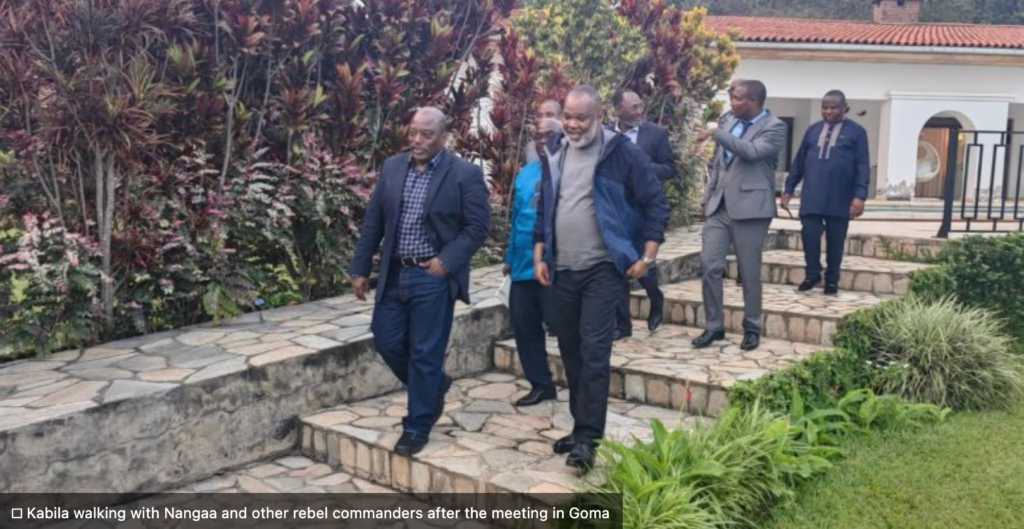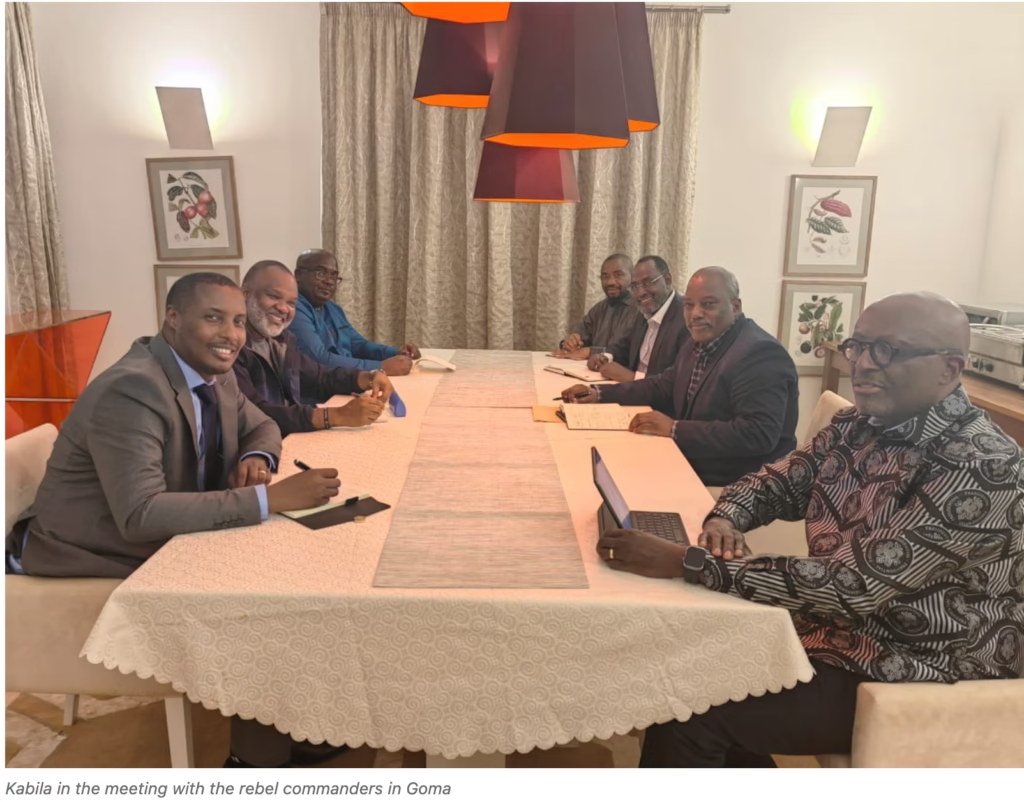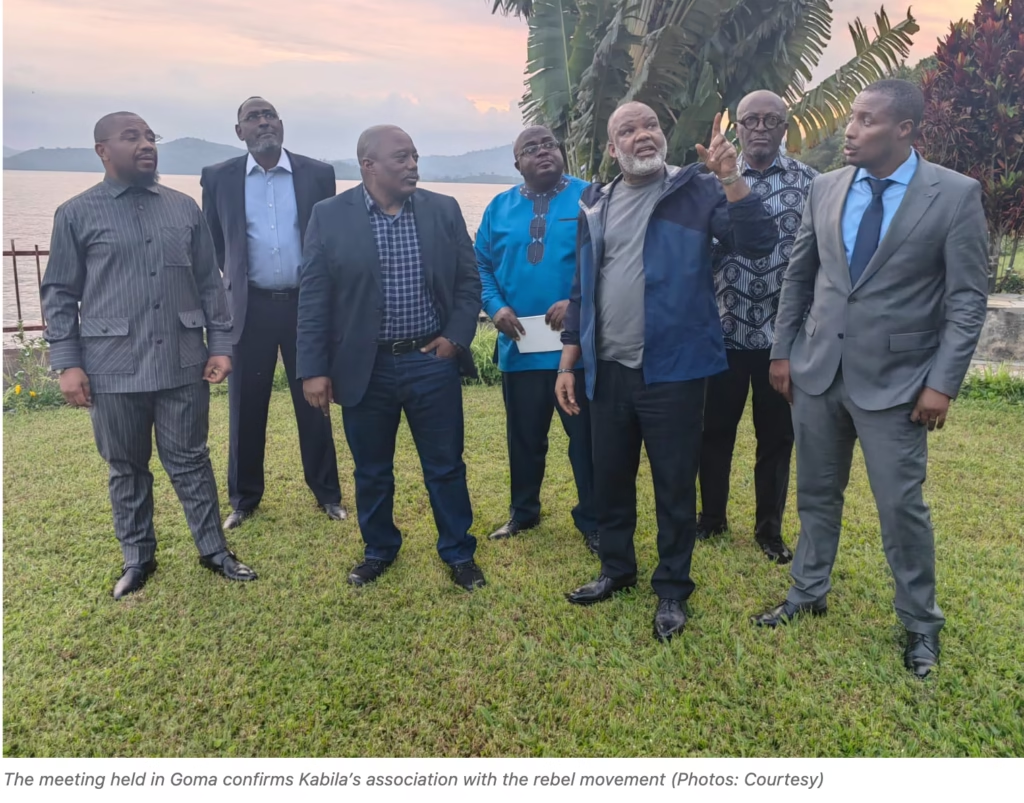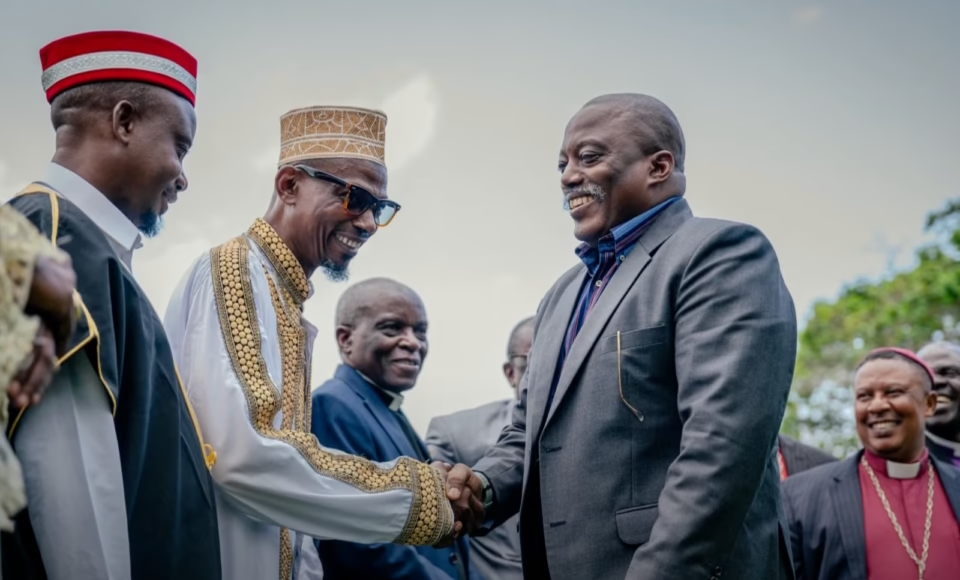By Dean Lubowa Saava
In a significant escalation of his political re-emergence, former Congolese President Joseph Kabila held a highly publicized meeting with leaders of the M23/AFC rebel coalition in Goma on Friday. This marks the first open engagement between Kabila and the insurgent alliance, accused of destabilizing eastern DRC.

The meeting was confirmed by AFC coordinator Corneille Nangaa, who posted photos and a brief statement on social media platform X, describing it as a “very good working session this afternoon at Goma between the coordination of AFC/M23 and the Honorary President Joseph Kabila Kabange.” Nangaa characterized the gathering as the “inaugural meeting of a series of reflections on how to establish and cement lasting peace, national cohesion, and definitive living together.”
The session, which took place deep inside M23-controlled territory, marks Kabila’s most explicit political alignment with the armed rebellion that Kinshasa has designated as a terrorist movement backed by foreign forces. Kabila’s direct talks with the M23/AFC follow weeks of rising tension between him and President Félix Tshisekedi’s government.

After months of accusations, the Congolese Senate recently voted to lift Kabila’s senatorial immunity, paving the way for his prosecution on charges of treason, war crimes, and crimes against humanity – all linked to his alleged support for the M23/AFC. Kabila responded defiantly, declaring his intention to “participate in the liberation of the country.”
His move into rebel-held territory and Friday’s meeting suggest a calculated shift from defensive legal posturing to an open embrace of insurgency-aligned political structures. “This meeting marks the moment Kabila has officially crossed the political Rubicon,” said a senior Kinshasa government source. “What was previously indirect association is now an open alliance.”
Analysts say Kabila’s latest maneuver aims to reshape his political relevance at a time when regional and international actors are searching for durable solutions to the conflict in eastern DRC. By positioning himself as a mediator for “peace and cohesion” within rebel-controlled zones, Kabila appears to be building a rival power center, potentially complicating ongoing peace initiatives led by Kinshasa, the African Union, Qatar, and the United States.

“It’s not about peace alone. This is about power-sharing and negotiating political survival,” said a regional diplomat monitoring the situation. “Kabila wants a seat at the table when the post-conflict settlement is designed.”
Kabila’s meeting with the rebels adds further strain to an already delicate regional balance. Earlier reports indicated that President Museveni had blocked Kabila’s attempt to enter Goma via Uganda, citing concerns that it would undermine Kampala’s military cooperation with Kinshasa against the ADF and damage Uganda’s lucrative trade ties with eastern Congo, valued at over $530 million annually.
Museveni’s long-held suspicions toward Kabila stem from his past laissez-faire approach to the ADF, which allowed the group to establish a stronghold in eastern DRC and later align with Al-Qaeda and ISIS. While Museveni has handled the matter diplomatically, his son, Gen. Muhoozi Kainerugaba, has been far more direct, recently stating: “I will never allow Joseph Kabila to become President of DRC again.”
Despite being blocked at the Ugandan border, Kabila used alternative routes to reach Goma and now appears to be consolidating ties with rebel commanders. The Kinshasa government has yet to officially respond to Friday’s meeting, but multiple sources within the presidency suggest that further legal and diplomatic measures are being considered. Justice Minister Constant Mutamba previously signaled that Kabila’s assets will be targeted as part of his prosecution.
“This is no longer a judicial file – it’s evolving into an existential challenge to state authority,” said a high-ranking Congolese government official. With peace talks intensifying behind the scenes and the region’s security architecture under review, Kabila’s growing alignment with M23/AFC forces threatens to upend fragile ceasefire negotiations.
His emergence as a self-declared broker for “lasting peace” raises fears that eastern Congo’s already fragmented conflict may enter a new phase – with political legitimacy now openly contested both inside and outside Kinshasa’s authority.



